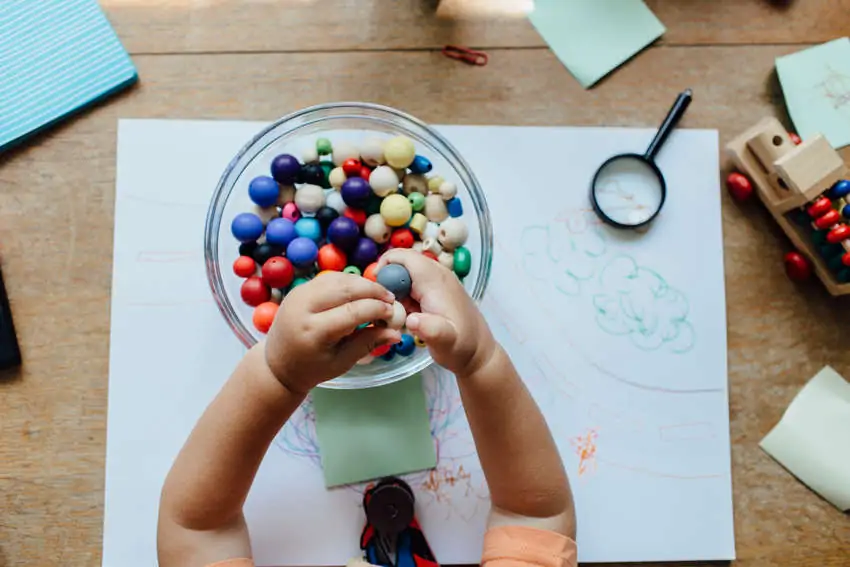How often do you say Good Job? Or Good Work? Or Great? Learn how to carefully craft meaningful and positive praise that is specific to your child’s abilities, accomplishments, traits and areas of weakness without saying a single “Good Job” or “Good Work.” Saying meaningful praise will go a lot further in building your child’s confidence when you use these tips.
Until earlier this year, I used to catch myself telling our kids, “good job” as a blanket statement of praise.
In fact, I had developed this bad habit of doling out “good jobs” whether I was cheering at a soccer game or admiring an art project. I hate to admit this, but it was mostly because I was only half-paying attention when they would ask for me to watch their cartwheel for the 29th time or as they practiced spelling their name again, and again (and again.)
More often than not, I was handing out “good jobs” as praise to appease my kids while I tried to stay focused on my own task at hand, and mostly because I didn’t take the time to think of anything better to say.
That all changed when my daughter showed me a work project from school and on auto-drive I told her “good job.”
Not satisfied with that answer, she looked at me and asked, “But Mommy, what do you think is good about it? What do you like about it?”
That was when it dawned on me that by simply saying “good job” I was giving her a generalized statement that didn’t give any specific details about what I was proud of or liked. I was giving her absolutely nothing of substance that could help build her confidence or understanding of encouragement.
Saying “good job” becomes a habit when we’re not fully engaged with our kids and looking for a quick handout that will pacify them.
Not only will kids learn to expect praise if you give it to them every time they have an accomplishment or want to show you something, but they will also learn that your praise is insincere.
It’s incredibly easy to mindlessly use the phrase “good job,” for example:
- Good job at soccer today.
- You ate all your lunch, good job.
- Good job picking up your clothes.
- Thanks for putting your shoes on by yourself, you did a good job.
- Good job jumping off the diving board by yourself.
- That was so nice of you to share your toys, good job!
You see how easy it is to be unspecific and use this phrase every day, all day, especially when you’re on auto drive?
Listen up, this passive praise is a habit you need to break right now.
If you cannot offer constructive praise with the capacity to be specific about an ability, accomplishment, characteristic or one of their strengths, then you may as well not dish out a “good job” because, in fact, it doesn’t do any good at all.
Two things to know about praise: it needs to be given in limited doses and it has to be specific to your child and the situation, in order to positively impact them.
BONUS: Alternatives to “Good Job”
THE PROBLEM WITH OVER PRAISING
When you overpraise children, they will come to expect praise even for everyday mundane tasks.
When a child expects praise and then they don’t receive it, their self-esteem and confidence are negatively affected. (Read here about how to 9 ways to boost your child’s confidence)
If they don’t receive what they’ve come to expect, they may also have feelings of unworthiness, failure, and insecurity in their abilities. Children who cannot adequately handle not receiving praise, won’t have the confidence they need to face failure and overcome challenges.
When you overpraise and then stop, kids will look for ways to get it with attention-seeking behavior. And what’s worse, is that children become dependent on receiving praise or rewards, they’ll begin to stop enjoying things that normally would give them joy – painting, competing, building, etc. – instead, they do these things for the purpose of receiving praise or a reward and the love they once had will diminish.
BE MORE SPECIFIC WITH PRAISE
When you give specific examples of praise you can build your child’s confidence and self-esteem, but can also help them problem solve, communicate better, trust in their own abilities and face failure.
Children know when you are only partially paying attention and if you’re simply offering them a cursory glance or an obligatory “good job” to appease them.
It only takes a few seconds to stop what you’re doing, watch them and really look at the picture they’re showing you. Saying a half-hearted “good job” is the easy way out, its dismissive praise and a generalized response that does absolutely no good. Instead, be specific and praise their character, their work, and skills, which will go a lot farther to boost their confidence and self-esteem.
Several examples:
- “I love the colors you chose to paint with, how creative and beautiful!”
- “Thank you for being a kind big brother and helping your little sister put her shoes on.”
- “When you put all your dishes away in the dishwasher, that was very helpful of you.”
- “Thank you for the card. You are very thoughtful to make such a nice card for me.”
GIVE THEM OWNERSHIP OF THEIR ACTIONS
I like to turn the praise back around to my kids, which shows them that the praise is about something they did well.
For example:
- “I really like the way YOU worked hard to get across the of monkey bars. YOU are very strong and didn’t give up when it got hard.”
- “YOU were very kind to share your toys with your sister. When YOU saw she was upset, I could tell YOU didn’t want to see her sad and what YOU did was very nice.”
- “I know YOU really wanted to win that race today, but I could see that YOU tried your best and I’m really impressed that YOU had good sportsmanship and congratulated the winner. I’m very proud of YOU.”
This goes a lot farther than simply saying, “Good job on the monkey bars,” “Good job sharing your toys,” or “Good job in your race.”
Each statement requires more thoughtfulness on the adult’s part to piece together more dynamic praise, but it effectively tells the child what they did well, and a strength that they showed.
LOOK FOR OPPORTUNITIES
Look for opportunities to point out character-building praise that can help grow confidence, in areas that they have low self-esteem and need a boost.
Ask yourself, What weaknesses and areas does my child have that I want to help them build confidence in?
Do they struggle with sharing, expressing their feelings, keeping their hands to themselves, accepting failure, being a good winner, having patience, listening, showing empathy, or helping with chores?
When your child successfully demonstrates strength in an area of weakness, take the opportunity to give them specific praise about their behavior. This is an optimal time to help them strengthen their confidence.
Examples of confidence builders:
- If your child is struggling with a math problem but after reworking it several times, he finally gets it, offer praise for his perseverance and positive attitude to keep trying until he figured it out.
- If they have been working hard on stacking blocks and can’t wait to show you the tall tower, praise them that you can see how hard they worked and the amount of concentration it must have taken to build it.
Don’t wait for your children to bring you something they want to show you, look for ideal openings to offer supportive praise – although limited to opportune times.
When you are strategic and specific about the praise you give you child, this will also show them that you are paying attention and are interested in what they’re doing – a big confidence booster in itself.
BONUS: Alternatives to “Good Job”
WANT MORE?
- The One Powerful Tip That Will Change Your Parenting Forever
- How to Create a Positive Home (And Why this Will Affect Your Kids Forever)
- 9 Ways to Build Your Child’s Confidence
- Help Develop an Emotionally Intelligent Child Who Can Talk About Their Feelings
- The Best Inside Activities for High-Energy Kids
- Stop Feeling Like You Have Mom Burnout
- What are the Triggers That Cause You to Yell and Lose It With Your Kids?
Want even more?
Shop All Parenting Resources
Shop all of our parenting resources from self-regulation tools and managing big emotions to building self esteem and confidence. There are resources for all seasons of life!







I never really thought about praise this way. I like it though. Very well laid out! I’m going to try to change the way I praise my kids. We’ll see if I can stick with it! Very thoughtful article!
Hi Heather! I didn’t think about formulating praise much either until my daughter pointed it out to me. I realized I was guilty of saying “good job” way (way) to much without any substance. It’s been a great confidence builder in our house – hopefully it works some magic in yours too.
Just the other day I was thinking about this same issue because I noticed that my 2 year old girl does something and directly looks at me waiting for praise
And it made me think .. I don’t want her to grow up waiting for praise about everything she does from everyone
I want her to be confident
I loved your post.. you said everything that was on my mind and more
Thank you for a great informative post
Hi Tuqa, thanks for the sweet comment. We’ve seen huge changes with more structured praise, and I absolutely love that the kids aren’t fishing for compliments and I have seen their confidence grow.
I love this article, it’s somthing I need to change about giving my own kids praise. I didn’t realize it until now, but I formulate a praise response to tell my kids even before their done with their task. That’s lazy! I like the fact that you pointed out to pay attention to the detail of what our kids are doing and compliment them on it. It can mean the world to our children.